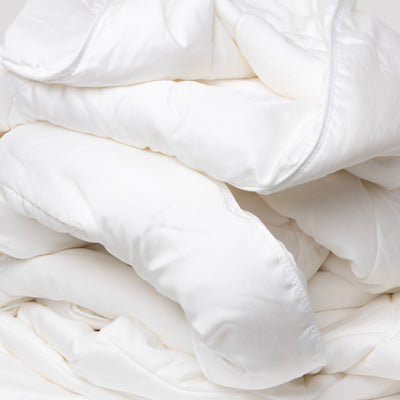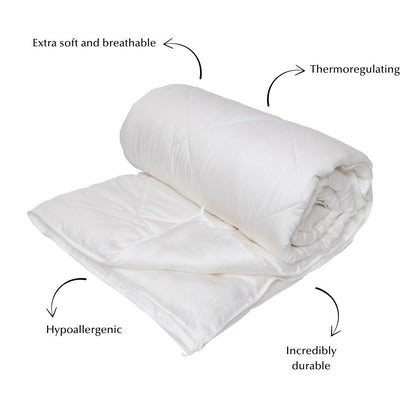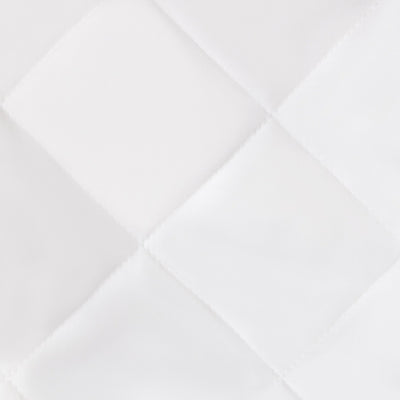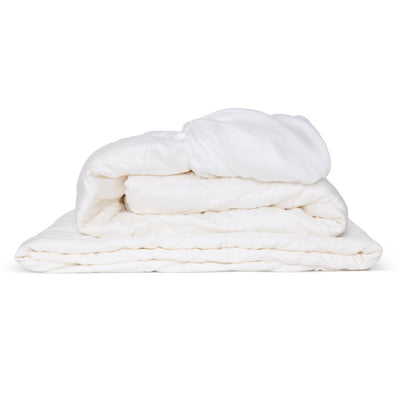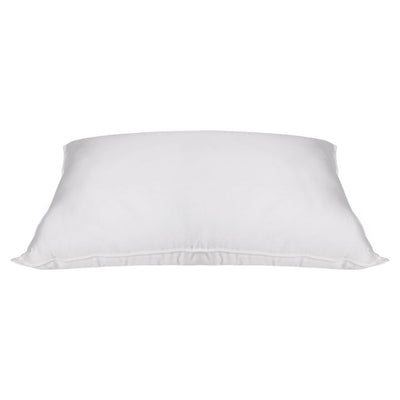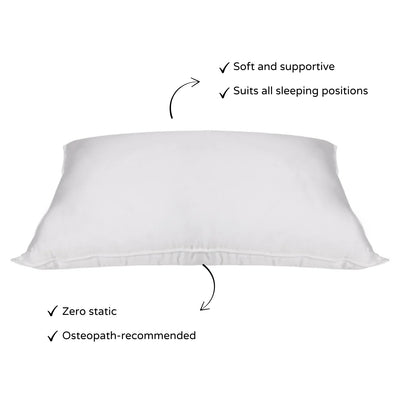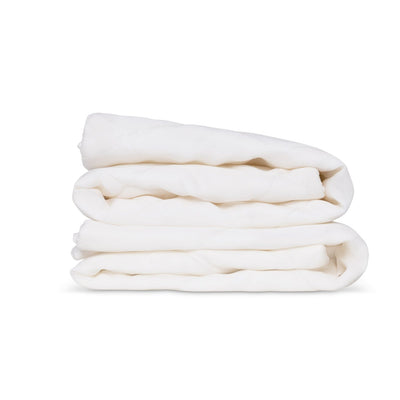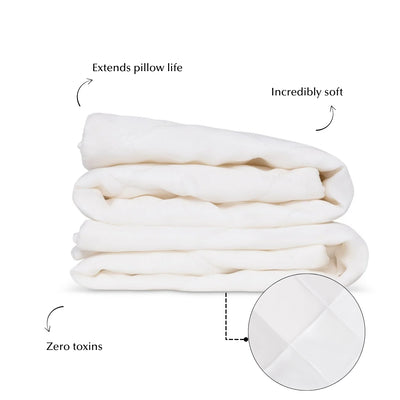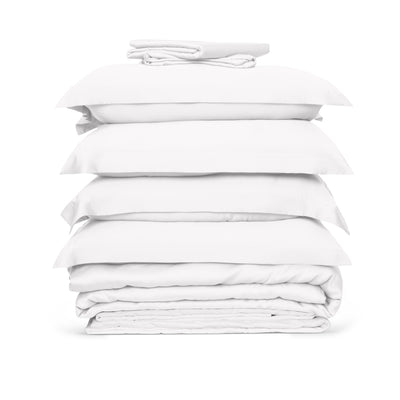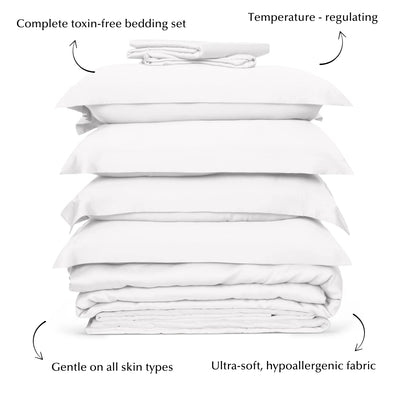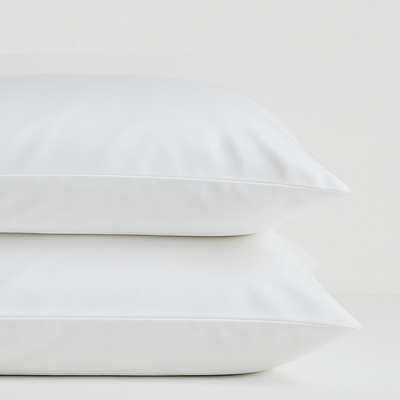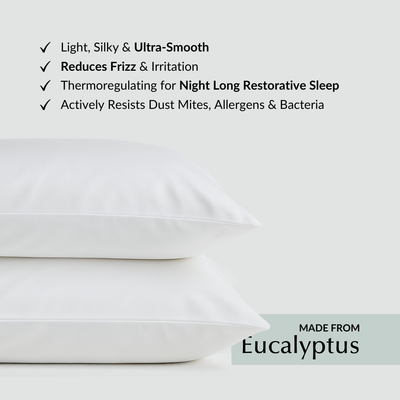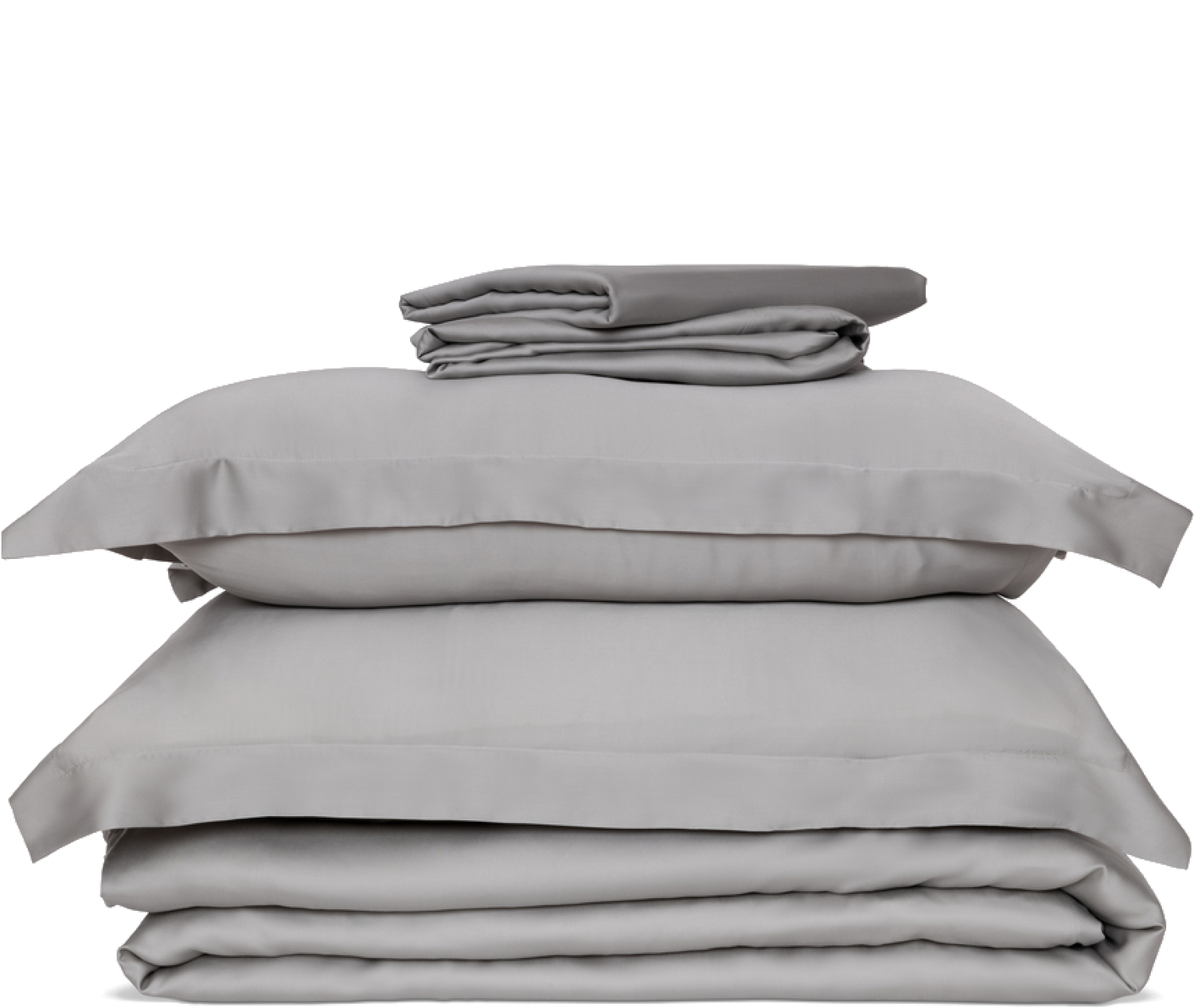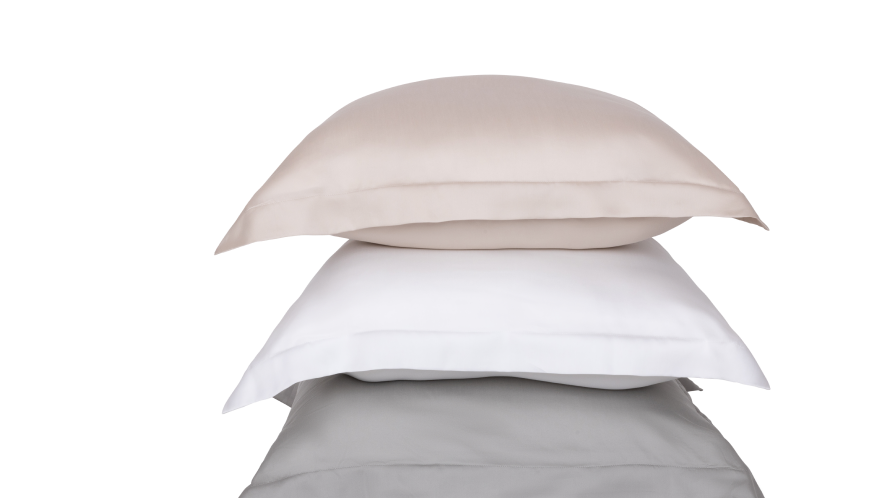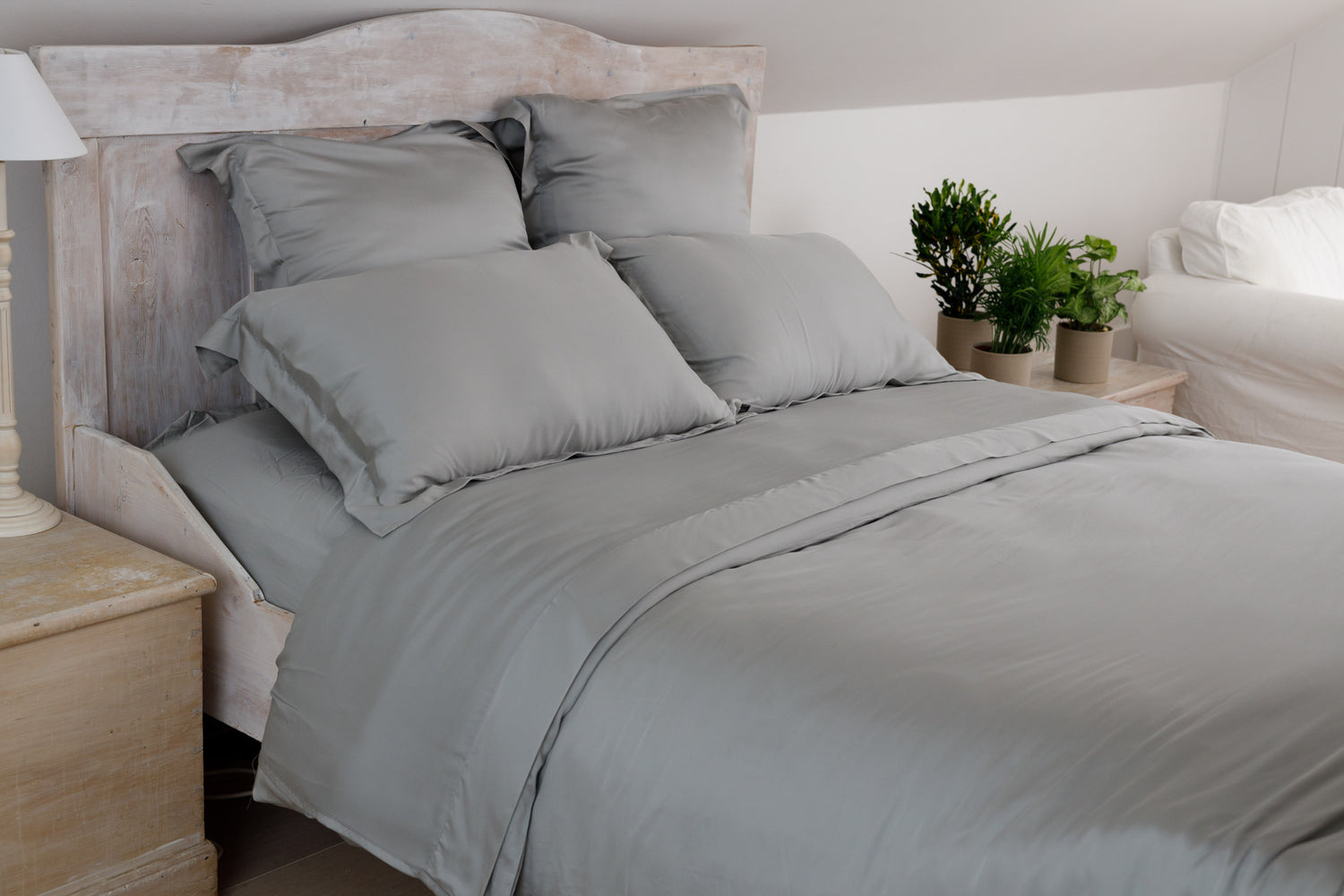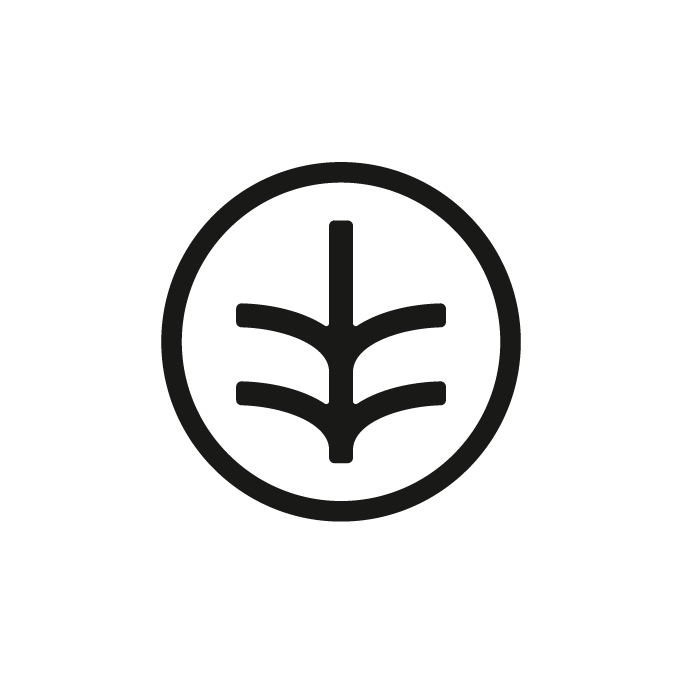We spend roughly a third of our lives in bed, so it’s important to ensure your bedding is as comfortable as possible, to give you a quality night’s sleep that best-prepares you for the day ahead. And this means choosing the right fabric for your bed sheets, duvet covers, and pillow cases.
This got us thinking: what is bamboo bedding, and how can it help to improve sleep quality and comfort? Read on to discover what bamboo sheet material is and how it compares to Egyptian bedding.
What is Egyptian cotton?

Cotton is the most common type of fabric used in bed sheet manufacturing, offering a comfortable night no matter the temperature. But Egyptian cotton is considerably more luxurious. Durable and easy to care for, as well as soft and breathable, Egyptian cotton has long-been a favourite among Brits looking for quality bedding.
How is Egyptian cotton made?
Traditionally, Egyptian cotton is made from extra-long-staple cotton fibres of Gossypium barbadense, a species of cotton grown in Egypt – often on the banks of the river Nile.
However, the name Egyptian cotton has unfortunately been appropriated by many regular cotton manufacturers around the world, who label their non-Egyptian cotton products as exclusive and luxurious to set a higher price.
Importantly, though, there is a simple way to identify true Egyptian cotton; authentic products will carry a black triangle logo on the packaging, which signifies that the product was grown in nutrient-rich Egyptian soil.
How does Egyptian cotton differ to regular cotton?
The main differences between regular cotton and Egyptian cotton are comfort longevity and the quality of sleep you enjoy.
Unlike regular cotton, Egyptian cotton can endure wash after wash without wrinkling, maintaining its smooth form to give you a comfortable night’s sleep for years – in fact, Egyptian cotton gets smoother after each wash.
But not only this; Egyptian cotton also offers chic charm to any bedroom and keeps you cooler and dryer at night than regular bed sheets. This breathability also helps to keep your skin healthier.
What is bamboo bedding?

Bamboo bed sheets are made from the long fibres collected from the bamboo plant, a sustainable and fast-growing grass that self-regenerates from the roots. This means that bamboo doesn’t need to be replanted when picked, making is an entirely renewable resource.
Because the fibres are so long and thin, there’s more space for the thread to be woven together, technically allowing for a more intricate knit and higher thread count.
However, the beauty of bamboo is that it doesn’t rely on a high thread count to offer unbeatable comfort and quality; even with a relatively low thread count, you’ll enjoy the same luxurious feel, breathability, and durability as high-thread-count Egyptian cotton.
How does bamboo bedding feel?
As a result of bamboo bedding (typically) having a lower thread count than Egyptian cotton, the space between the fibres is wider. Of course, you don’t necessarily notice this when comparing the two side by side because the difference is on such a small scale, but you’re able to feel the effective and efficient breathability that’s made bamboo bedding sets such a popular choice among sleep experts.
Focusing closely on the composition of bamboo vs cotton, it’s interesting to note some particularly subtle differences in the fabric feel. While both offer a soft and cosy night’s sleep as standard, bamboo has a silkier feel to touch. In contrast, Egyptian cotton sheets have a crispness that slowly softens over time.
Why choose bamboo bedding?
There are a number of reasons why you might want to choose bamboo over alternative fabrics – including Egyptian cotton; not least, because it helps to dramatically improve the sleep quality and comfort you’ll enjoy on a nightly basis. The main benefits of choosing a bamboo bedding set include:
- Temperature regulation – bamboo sheets are naturally temperature regulating, meaning they’re designed to keep you comfortable whether it’s hot or cold. This makes them the perfect pick as an all-seasons solution.
- Softness – bamboo is among the softest bedding fabrics you can choose from, and even with a lower thread count than Egyptian cotton, you’ll enjoy silky sheets and duvet covers that make it easier than ever to quickly drift off into a comfortable slumber.
- Allergen resistance – bamboo material is naturally hypoallergenic, meaning you don’t have to worry about lingering dust, mites, or germs whenever you head to bed.
- Breathability – bamboo’s moisture-wicking properties ensure you’ll always feel cool and comfortable at night, even when trying to sleep during a heatwave.
- Stain resistance – bamboo fabric is effective at maintaining its colour, no matter the amount of moisture absorption. This makes your bamboo bed sheet or bamboo duvet cover straightforward to look after, without requiring strong chemicals during cleaning.

Types of bamboo fibre
While all types of bamboo bedding offer the same core properties (a soft and comfortable night’s sleep all year round), there are a few different ways that bamboo sheets can be manufactured that you should be aware of. The different types of bamboo fibre include:
Rayon
A large proportion of bamboo sheets are made from bamboo rayon, which is essentially a fabric created by manipulating and reshaping the bamboo fibres. This guarantees soft comfort with every bamboo sheet, duvet cover, and pillow case.
Tencel/Lyocell
Although many bamboo sheets are manufactured using rayon bamboo, we opt for the more sustainable solution: Tencel.
When it comes to Tencel/bamboo lyocell vs cotton, the key difference is in production. Both are manufactured using natural fibres, but Tencel comes from processing the bamboo until the grass becomes a pulp. Cellulose is then extracted from the pulp, which is then threaded into long fibres and woven. The benefit of this process is that it produces a biodegradable product that contributes to a more sustainable society.
Linen
The processes involved in manufacturing bamboo linen are the same as those in the production of regular linen. This type of bamboo bedding prioritises coolness at night, keeping you comfortable in even the warmest temperatures. However, similarly to regular linen, bamboo linen is a little more prone to wrinkling than alternative variations!
Egyptian cotton vs bamboo sheets
We’ve looked at each of bamboo and Egyptian cotton individually, but how does each stack up when put side by side? We’ve looked at a series of key characteristics and properties, and assessed how each of the two popular fabrics compare.
Care and durability
As far as care and durability go, Egyptian cotton and bamboo are both up there among the best bedding options, offering long-lasting and exceptional quality. In fact, it’s not unheard of for both types of fabric to last upwards of ten years.
However, though they’re both long-life, both bamboo and Egyptian cotton require great care to ensure an extended lifespan. This means gentle cycles on a cooler wash, to avoid pilling and a drop in softness.
Despite the similarities between the two materials, though, bamboo outranks Egyptian cotton when it comes to maintaining its natural colour and appearance. While bamboo keeps its colour, cotton will absorb sweat and oil from your body as you sleep, which can lead to yellow/grey stains after a while.
Feel
One of the resounding benefits of bamboo bedding is its soft and silky feel, gifting you a cosy sleeping environment every time you head to bed. However, that’s not all. Bamboo is also light and breathable, with natural moisture-wicking properties, ensuring your bedding never feels uncomfortable on your skin – even in the height of summer!
Much of the same can also be said of Egyptian cotton, which naturally gets softer with every wash. However, to enjoy maximum softness, Egyptian cotton sheets need a much higher thread count than bamboo equivalents.
Health
For many people – especially those with sensitive skin - it’s important to choose bedding that’s naturally hypoallergenic, to provide a more comfortable night’s sleep.
Fortunately, bamboo’s moisture-wicking properties prevent bacteria and odours from settling on your sheets, as well as dust and mites for those who are prone to night time sneezing! On the other hand, Egyptian cotton, while gentle on the skin, isn’t quite as resistant to allergens such as mites and odours.
Temperature control
The beauty of bamboo is that it’s an all-seasons material, keeping you comfortable no matter the temperature – whether it be mid-summer or the chilliest winter. The moisture-wicking and heat regulating properties of bamboo ensure your bedding’s always breathable, keeping you cool when the temperature picks up but warm and cosy when it starts to drop.
Egyptian cotton is also exceptionally breathable, due to it being a lightweight fabric, with fibres stitched in such a way that accommodates effective airflow when your bedding gets that little bit too warm.
Breathability
Bamboo bedding is highly breathable, and pulls sweat from your skin as you sleep to keep you dry throughout the night. But how about the alternative: is cotton breathable? In short; yes – but not necessarily as effectively as bamboo bedding. In fact, bamboo can absorb up to 40% more water than cotton
However, that doesn’t mean Egyptian cotton isn’t still an effective bedding solution if you find yourself struggling with sweating at night. A natural fibre that allows air to circulate efficiently, Egyptian cotton absorbs moisture throughout the night to keep you cool and dry.
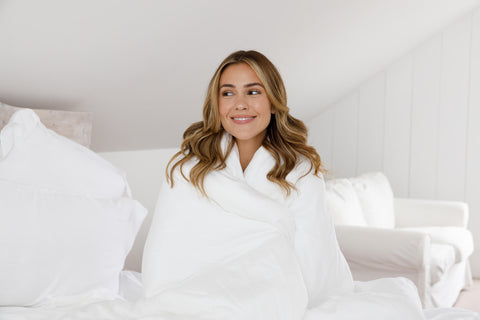
Shop Ethical Bedding's breathable Eucalyptus and Bamboo Duvet
Thread count
While Egyptian cotton is known for its luxuriously high thread count, which aids durability and enhances softness, bamboo bedding achieves the same with a lower thread count. This contributes to bamboo being a breathable bedding solution that doesn’t compromise on comfort.
Bamboo bedding typically has a thread count between 250-400 (our bedding is a super-soft 300), while Egyptian cotton thread count often falls between 400-700 – although bamboo thread is widely considered to be the softer pick no matter the thread count.
Environmental impact
As a completely renewable resource, bamboo is an environmentally-friendly bedding solution that contributes to reducing your carbon footprint. And, in addition, all of our bedding is manufactured from fabrics grown in biodiverse forests, as well as never being treated with pesticides. Not only that, but the materials used in our bedding also use 95% less water in production than cotton, and 30% less energy.
Cost
As with all fabric types, you can find Egyptian cotton and bamboo bedding available for a wide range of prices, whether you’re looking for something affordable or particularly luxurious.
However, bamboo bedding is, generally speaking, much better value for money, as you don’t require such a high thread count to enjoy an equally comfortable night’s sleep; you’ll have the same soft silkiness, without paying the premium expected of high-thread-count Egyptian cotton.
Now that you know the differences between bamboo and Egyptian cotton, you can begin to explore our complete bedding collection with confidence. Or, for even more interesting insight from our sleep experts, check out the latest over on the Ethical Bedding blog!

